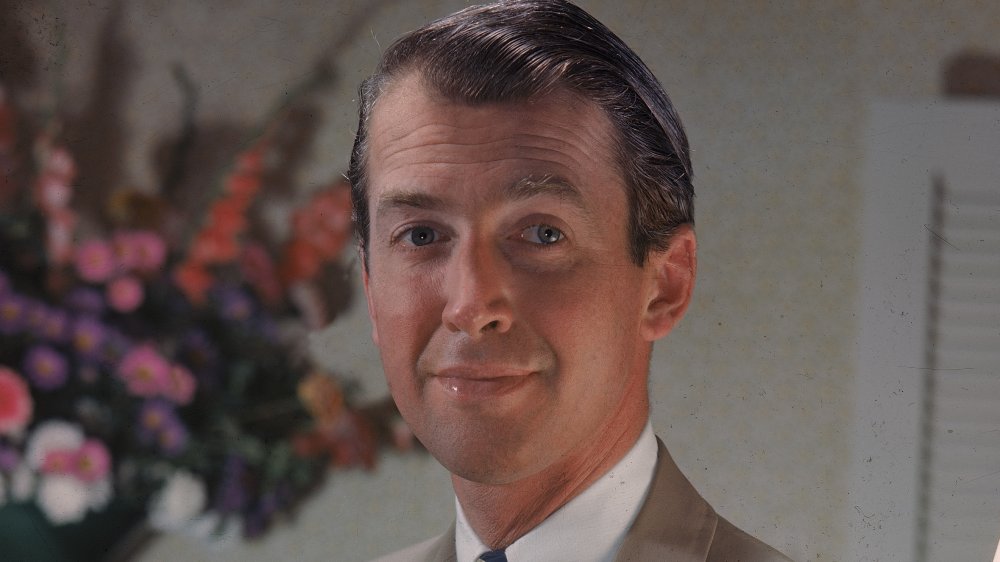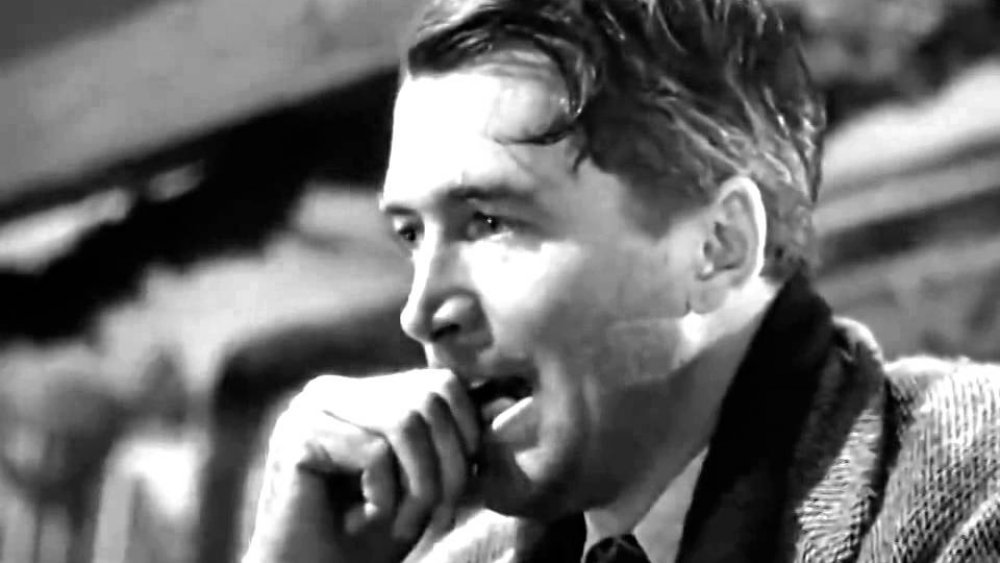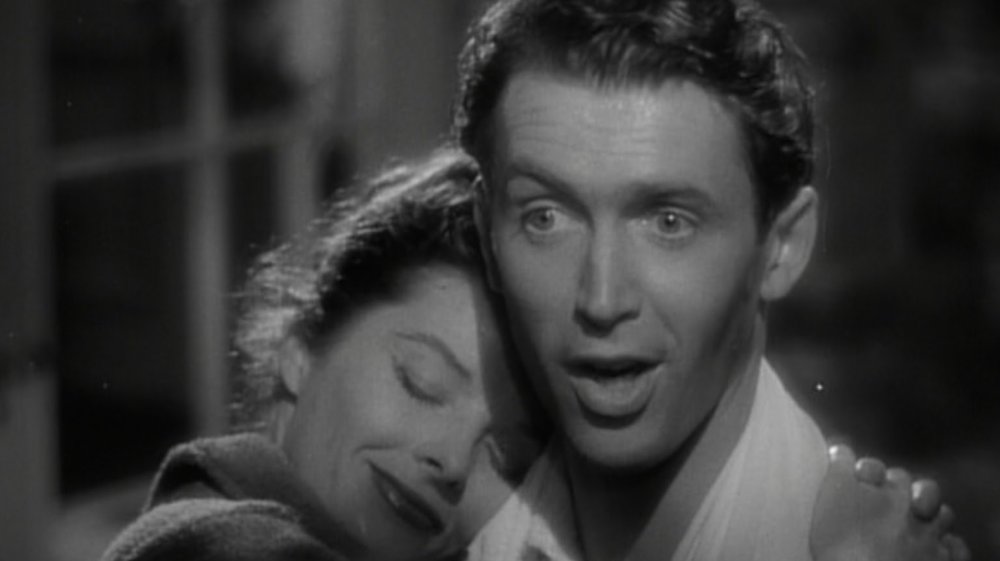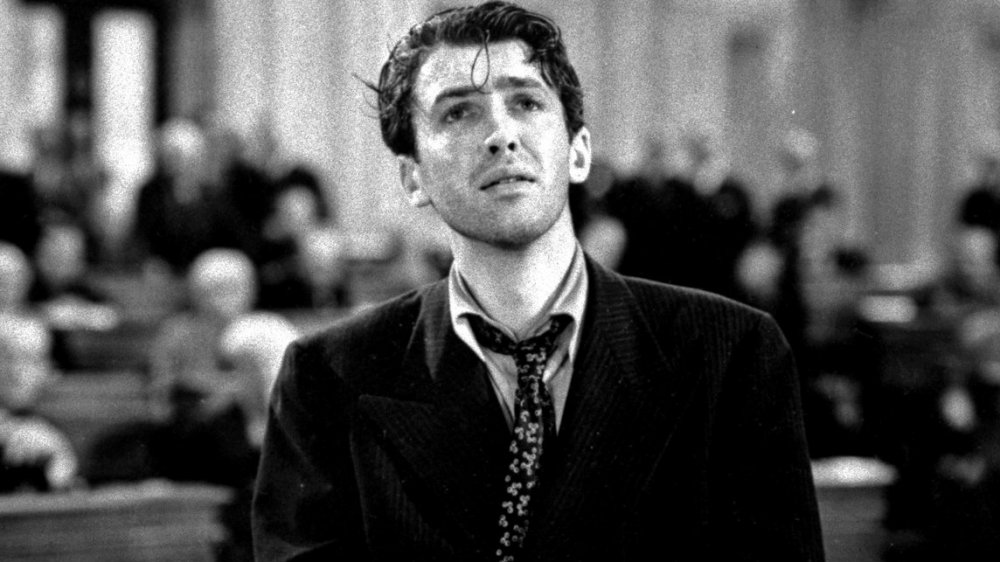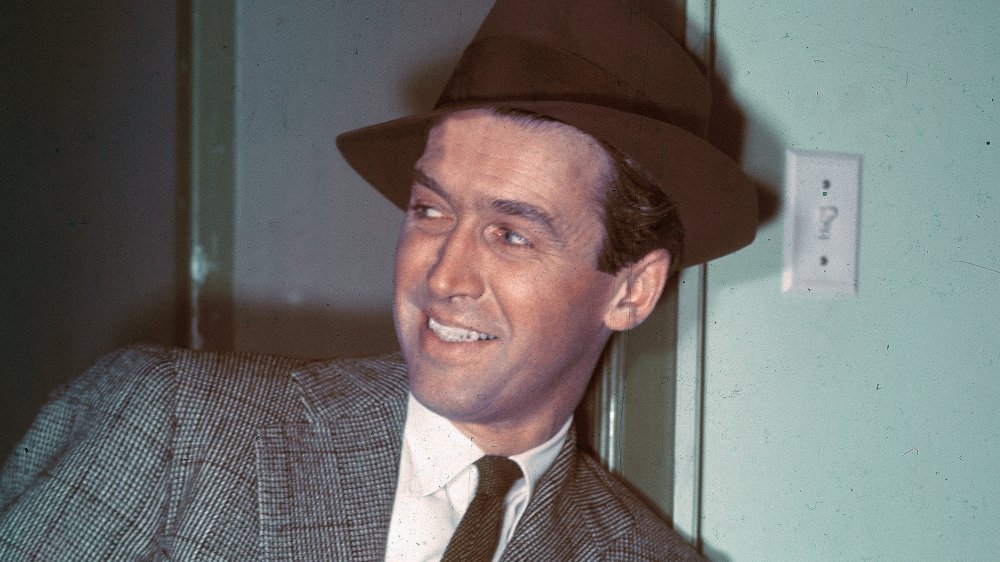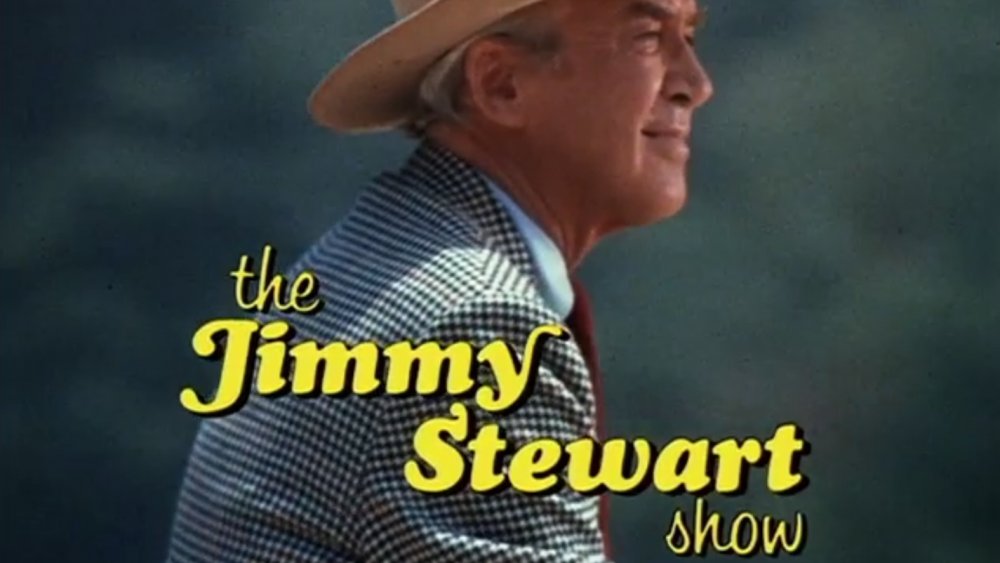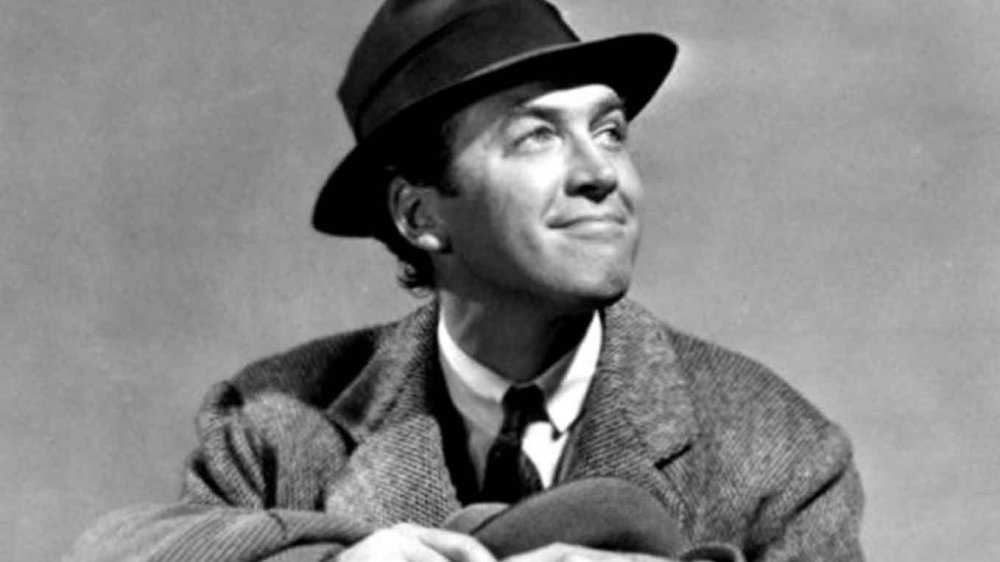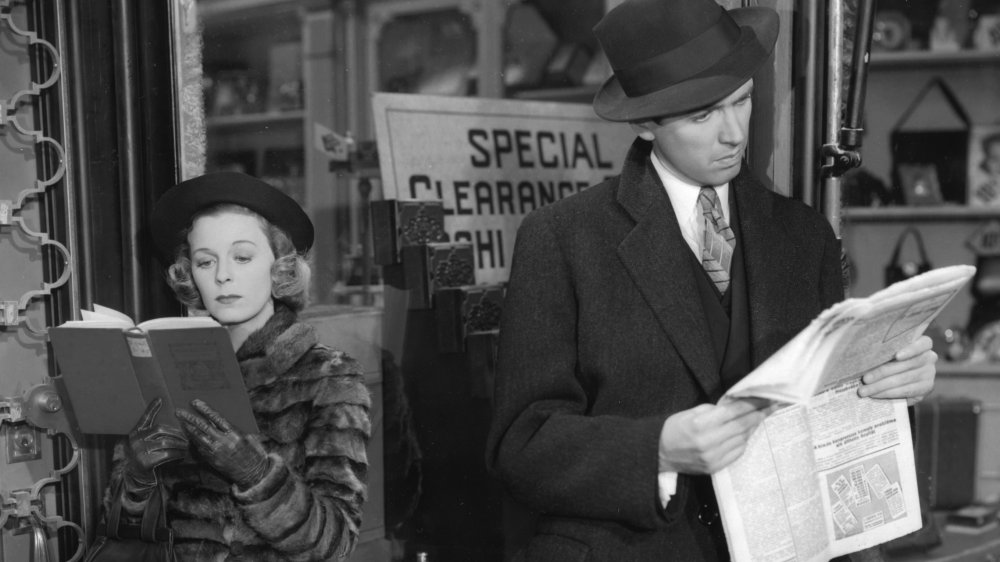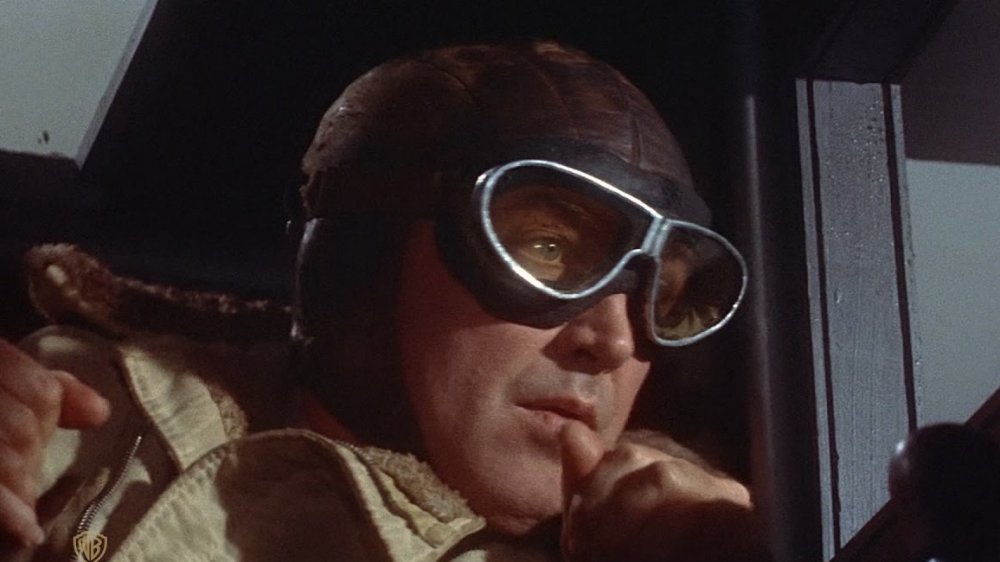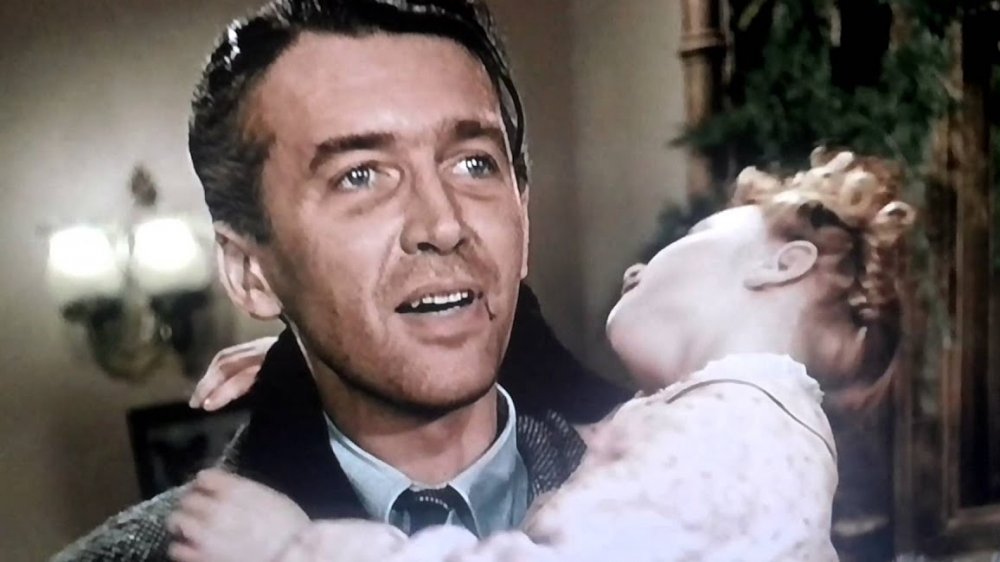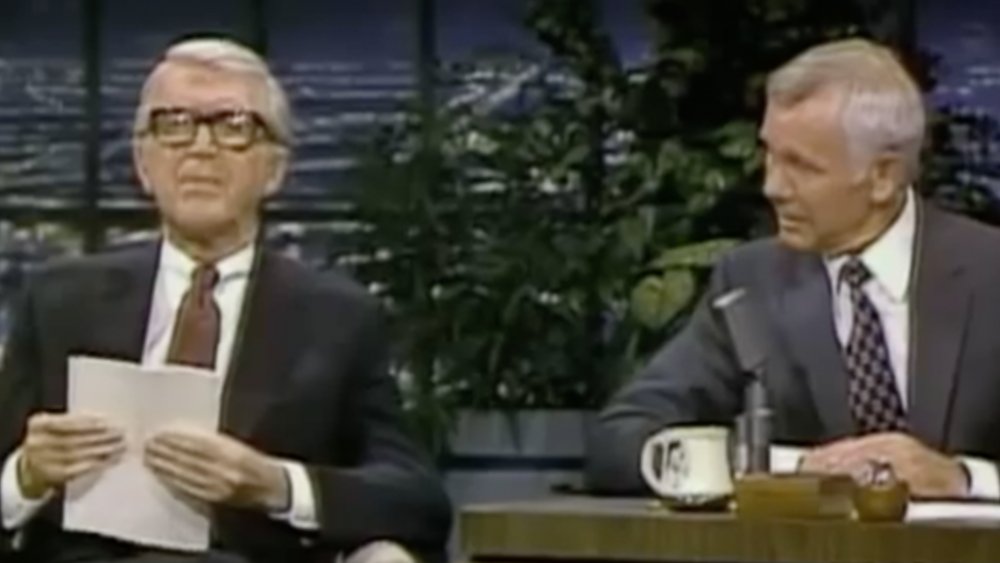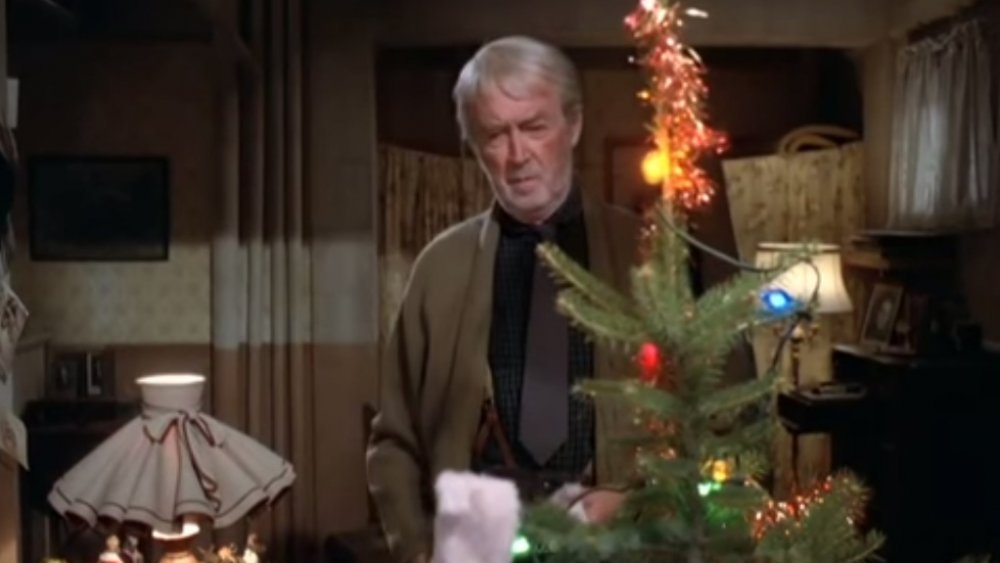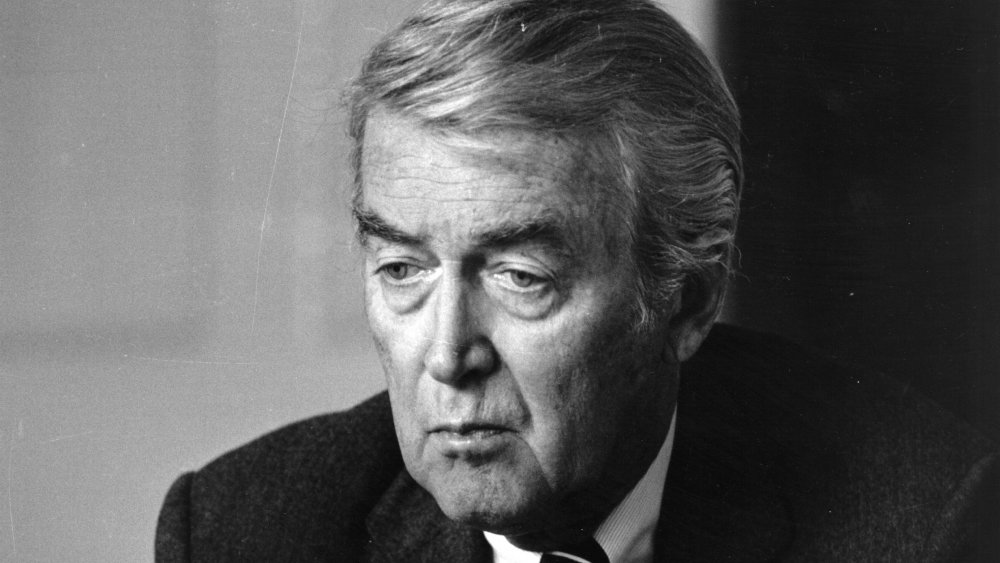The Untold Truth Of Jimmy Stewart
There are legends of Hollywood's Golden Age, and then there's the actor professionally known as James Stewart, who everybody just called Jimmy. Why? Because Jimmy Stewart was just that much of a likable, everyday kind of guy. Millions of movie fans still see something of themselves in Stewart's characters, who more often than not are regular people facing powerful villains, steep odds, and tight situations. Despite these trials, they remain dreamers who stay true to themselves and win in the end. Stewart's characteristic charm and gumption helped make classics out of films like It's a Wonderful Life, Mr. Smith Goes to Washington, Harvey, The Philadelphia Story, Rear Window, Vertigo, and many, many more.
Believe it or not, this towering figure of American pop culture had an offscreen existence just as colorful and dramatic as the lives of the characters he so honestly and earnestly portrayed. Here's a look into the wonderful life of Jimmy Stewart.
Jimmy Stewart improvised a pivotal moment in It's a Wonderful Life
It's a Wonderful Life is an unassailable classic. This profoundly moving Christmas movie follows George Bailey, a small town family man on the verge of suicide, who realizes his personal worth and value to the world when an angel-in-training takes him on a journey through space and time. Jimmy Stewart gives an iconic performance as George Bailey, variously inspiring, heartbreaking, and even outright funny. The screenplay by Frances Goodrich, Albert Hackett, and director Frank Capra is airtight, but Stewart still found innovative ways to interpret and elevate the material in his own unique way.
In one memorable scene, a defeated George sits in a bar and thinks about ending his life, only to instead tearfully pray for some kind of divine intervention. Stewart nailed the scene on the first take, and was so in the moment that he started crying, which wasn't scripted or expected. Director Frank Capra didn't know Stewart was going to do that, and had set up for a medium shot. This meant he didn't capture a close-up of Stewart's anguished, broken face. He asked Stewart for another take, but both men rejected the notion, knowing the second time would ring false. So, when it came time to put It's a Wonderful Life together, Capra had his editor zoom in on Stewart in each individual frame. The end result looks a little grainy, but is no less emotionally resonant for it.
Jimmy Stewart didn't think much of his Academy Award
In the 1940s, 1950s, and 1960s, a period lousy with classic films and ironic performances, Jimmy Stewart managed to receive five Academy Award nominations, all in the Best Actor in a Leading Role category. Stewart was recognized for his work in Mr. Smith Goes to Washington, It's a Wonderful Life, Harvey, and Anatomy of a Murder. The Philadelphia Story is the only one that actually netted him an Oscar win (not counting his honorary lifetime achievement award in 1985).
Stewart didn't really believe he deserved the prize, though. "I never thought much of my performance in The Philadelphia Story," he said, adding that he thought there was "some truth" to Hollywood insider suggestions that his Oscar for such a relatively frivolous film was a make-up prize, or "deferred payment" for his bravura performance in Mr. Smith Goes to Washington a year earlier. Stewart thought Henry Fonda ought to have won for The Grapes of Wrath instead, and nearly didn't even attend the Oscars ceremony. Just before the show, someone associated with the awards called Stewart and tipped him off as to his win, suggesting it would be worth his while if he showed up. It was, in the end — but his opinion endured, regardless.
He wasn't supposed to be in Mr. Smith Goes to Washington
Mid-20th century America was a very formal time period. Even Hollywood shied away from addressing an adult male by his first name, churning out films with titles like Here Comes Mr. Jordan, Mr. Blandings Builds His Dream House, Mr. Hobbs Takes a Vacation, Mr. Deeds Goes to Town, and Mr. Smith Goes to Washington. That last movie stands out from the pack, however, as it gave the world one of Jimmy Stewart's most memorable and powerful performances. Stewart played Jefferson Smith, a scout leader turned appointed U.S. Senator who is achingly idealistic. He is yet untouched by the cynical and corrupt political machine, and so he fights earnestly for truth and honesty in the midst of corruption, culminating in a dramatic filibuster scene.
This 1939 film was one of Stewart's breakthrough roles, and earned him his first Academy Award nomination. But believe it or not, it wasn't even supposed to be his project. Mr. Smith Goes to Washington was initially conceived as a sequel to the similarly fish-out-of-water film, Mr. Deeds Goes to Town, which starred Gary Cooper in the title role. Filmmakers intended Cooper to continue his character's journey in Mr. Deeds Goes to Washington. Once Cooper became unavailable, the filmmakers realized the movie was actually much more suited to Stewart and his "regular guy" persona. As it turns out, they were entirely correct.
Jimmy Stewart turned down three Oscar-winning roles
Many of the biggest stars of Old Hollywood landed career-capping roles later in life. Henry Fonda, for example, took home an Oscar for his performance as a dying old man disconnected from his daughter (opposite real-life daughter Jane Fonda) in 1981's On Golden Pond, then died just a few months later. Jimmy Stewart never got that sort of definitive career-ender, but On Golden Pond very nearly filled that spot — he was offered the film before producers went with Fonda, but turned it down because it upset him. "He didn't like the relationship the old man had with his daughter in the film," Stewart's agent Bill Frye said in Marc Eliot's Jimmy Stewart: A Biography. "Jimmy loved both his daughters and couldn't imagine a father treating one the way the character did in the film, and therefore refused to play him."
That's not the only big, Academy Award-winning role Stewart passed on. Stewart was also offered the role of crusading, progressive, and sensitive attorney Atticus Finch in 1962's To Kill a Mockingbird. "He felt the racial thing was too controversial," Frye said, "too liberal really, but he would never say it that way." Stewart also turned down Peter Finch's Oscar-winning role in 1976's Network because the part required him to use profanity on screen, which the actor simply wouldn't do.
Jimmy Stewart couldn't cut it on TV
Today, actors move freely between film and television, thanks to prestigious projects on outlets like HBO and Netflix. Back in the 1970s, however, there were "movie stars" and "TV stars" and rarely did those two camps exchange members. This meant it was a big deal when a major film actor like Jimmy Stewart deigned to star in a sitcom. So it went with The Jimmy Stewart Show, which debuted on NBC in 1971, featuring Stewart as James K. Howard, a professor at a small college with an amusingly kooky home life. Despite the hype and the pedigree (besides Stewart, the show was created by prolific, award-winning TV writer Hal Kanter), The Jimmy Stewart Show flopped, finishing the TV season in 44th place. NBC canceled the show after 24 episodes.
Nevertheless, Stewart gave TV another chance in 1973 when he starred in the CBS detective drama Hawkins as rural lawyer Billy Jim Hawkins, who takes a hands-on investigative approach to his cases. Stewart won a Golden Globe for Best TV Actor in a Drama, but the show wasn't a real hit, ranking 37th in the ratings. It was canceled because Stewart walked away. "I had to give it up. It was all too hectic for me," he said. "I just couldn't keep up. I had so many lines to learn and not much time to learn them."
Jimmy Stewart loved acting opposite an invisible rabbit
While Jimmy Stewart most frequently starred in dramas — some of them lighter fare, like It's a Wonderful Life, while others were heavy, like Vertigo – the actor also had a knack for complex comedy. He showed this talent off with aplomb when he starred in 1950's Harvey as Elwood P. Dowd, a curious, lovable, and undeniably strange man committed to a mental hospital by his sister when he claims to be friends with Harvey, an unseen and assumedly imaginary six-foot-tall rabbit-like creature.
Stewart really liked playing Elwood P. Dowd. So much did he like it, in fact, that he kept returning to the role whenever the opportunity presented itself. He starred in the original Broadway stage production of Harvey in the 1940s, which netted author Mary Chase a Pulitzer Prize. When the show earned a Broadway revival in 1970, 61-year-old Stewart once again portrayed Dowd and won a Drama Desk Award. Two years later, Stewart gave Harvey one more try, starring as Dowd in a made-for-television adaptation. Apparently, the bond between man and imaginary rabbit is enormously strong.
Jimmy Stewart lost a lady to his best friend
Primarily a stage actress, Margaret Sullavan appeared in only 17 movies in her short career. But when she did appear on the silver screen, it was often beside Jimmy Stewart, as in The Shopworn Angel, The Shop Around the Corner, and The Mortal Storm. They knew each other from their early years in summer stock theater, where, according to Lawrence J. Quirk's biography of Sullavan, Stewart fell hard for the actress. He was too shy to romantically pursue her, however, and another member of their tight-knit theatrical circle, Henry Fonda, liked Sullavan also. Eventually, those two married. Stewart would eventually marry as well, in 1949 at age 41 to Gloria Hatrick McLean, but not before enjoying a number of years as one of Hollywood's most eligible and active bachelors. "Marlene Dietrich all but attacked him, and Ginger Rogers was crazy about him," Stewart biographer Marc Eliot told Today. Other mid-century female Hollywood luminaries Stewart dated include Loretta Young, Olivia de Haviland, Norma Shearer, and Dorothy Lamour.
Jimmy Stewart was an accomplished pilot
While honing his chops as a film actor in the 1930s, Jimmy Stewart also pursued his other passion: flight. According to Military.com, Stewart amassed more than 400 flight hours as an amateur pilot by the decade's end, which served as ample training for military service. Shortly after the United States entered into World War II in 1941, Stewart was drafted and enrolled in flight training school at Moffett Field in California. In 1943, the Air Force sent Stewart to Europe as the Commanding Officer of the 703rd Bomb Squadron. By the end of the war, Stewart was Chief of Staff of the 2nd Combat wing, 2nd Air Division of the 8th Air Force, having flown in 20 combat missions. Stewart stayed on with the Air Force Reserve as a brigadier general, retiring from duty in 1968.
Stewart stayed closely affiliated with aviation his entire life. He starred in The Spirit of St. Louis, a 1957 biopic about pilot Charles Lindbergh, and in 2009, he was inducted into the National Aviation Hall of Fame. Stewart even enjoyed the rare honor of becoming an airport namesake. The Indiana County Jimmy Stewart Airport is situated close to the actor's hometown in western Pennsylvania.
Jimmy Stewart fought against colorizing old movies
Cable TV exploded in popularity in the 1980s, thanks in so small part to the programming choices and massive cash infusions provided by Ted Turner, whose company owned and operated CNN, TNT, and TBS, among other top-rated channels. Turner wanted to put classic Hollywood movies on some of his outlets, but in order to make them more palatable to modern audiences, he led a contingent that wanted to colorize those old, gloriously black-and-white films. This became a controversial issue, as altering seemingly untouchable movies from their original forms was unthinkable to film purists and many of the people who actually made those films way back when.
Opponents of colorization lobbied Congress to prevent it from happening, including Jimmy Stewart, who personally met with representatives to convince them to legally limit or prevent colorization in some way. Thanks to the testimony of people like Stewart, in 1988 the House Appropriations Committee okayed a plan for a National Film Commission, which would identify and protect classic American films. Black and white films that did go through the colorizing process would have to include a disclaimer warning viewers of the change. They would also not be allowed to use their original, theatrical titles.
Jimmy Stewart fancied himself a poet
Jimmy Stewart was a guest on Johnny Carson's The Tonight Show a whopping 40 times. As a Hollywood legend, Stewart had a blank check to do whatever he wanted on the late-night juggernaut, which explains how he got away with reading a poem — and a cute, sad poem about a deceased dog at that. In July 1981, Stewart read "Beau," a loosely structured (but still rhyming) piece about the life of his incorrigible and lovable pet dog. By the end of the recitation about his dearly departed pooch, Stewart was holding back tears — as was Carson, probably most of the viewing audience, and likely whoever watches the clip today.
For a few years after, Stewart would occasionally bring a poem with him when he'd appear on The Tonight Show. The segments proved so popular that publisher Crown signed Stewart to publish Jimmy Stewart and His Poems, the collected poetic works of the well-known actor. Stewart wasn't all that prolific a poet: At the time of the book's release in 1989, he claimed to have only ever written "at the very top eight" works of verse in his whole life. Only four of them were included in the book, a 33-page volume padded out with illustrations and anecdotes provided by Stewart. Jimmy Stewart and His Poems was a roaring success — according to the Washington Post, the book sold 300,000 copies. Those are some seriously blockbuster numbers for a volume of poetry.
Jimmy Stewart's final roles
According to The Jimmy Stewart Museum, Stewart slowed down as an actor in later years, and ultimately went into a period of semi-retirement as his advancing age introduced health issues into his life. He became very choosy with his roles around 1980, appearing in only half a dozen projects from then on. In addition to a supporting role in the Civil War-set TV miniseries North & South: Book 2, Love & War, and providing voiceovers for a string of warm and folksy Campbell's Soup commercials, Stewart starred in the made-for-television film, Mr. Krueger's Christmas. Produced and approved by the Church of Latter Day Saints (colloquially known as the Mormons), Stewart, a practicing Presbyterian, took the role because the movie involved his character conducting the famous Mormon Tabernacle Choir — something that happened to be a bucket list item for the actor.
So what was Stewart's last role? Weirdly enough, it was voicing Wylie Burp in 1991's An American Tail: Fievel Goes West. Stewart's character is an elderly, bumbling dog and Wild West sheriff whose name is a goofy parody of that of real-life lawman, Wyatt Earp. It's a whole lot less well-remembered than George Bailey, but hey — a career has to end sometime.
Jimmy Stewart had a lot of health problems and died in 1997
Jimmy Stewart stopped acting after he recorded his lines for Fievel Goes West, but appeared as a talking head in TV documentaries into the 1990s. He retired from life as a public figure and entertainer altogether, according to The Jimmy Stewart Museum, after the death of Gloria Stewart, his wife of 45 years, in 1994. By that point, he was in his mid-80s, and his health had been on the decline for many years. Stewart wore a hearing aid, lived with heart problems, and had endured a bout of skin cancer. On July 2, 1997, per Marc Eliot's Jimmy Stewart: A Biography, the actor suffered a heart attack caused by an embolism, which lodged a blood clot in his lungs, and passed away. He was 89 years old.
Tributes poured in from his Hollywood contemporaries and heads of state. "He was a great actor, a gentleman, and a patriot," said President Bill Clinton, while former President Ronald Reagan noted Stewart's "grace and humility." Charlton Heston said that the actor possessed "the quintessential American face," while Frank Sinatra called Stewart "uniquely talented." For these qualities and more, Stewart remains beloved to millions of fans worldwide.
